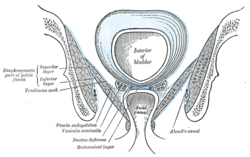Tendinous arch of pelvic fascia
| Tendinous arch of pelvic fascia | |
|---|---|
 Coronal section of pelvis, showing arrangement of fasciæ. Viewed from behind. (Tendinous arch labeled at left.) | |
| Details | |
| Latin | arcus tendineus fasciae pelvis |
| Identifiers | |
| Gray's | p.422 |
| Dorlands /Elsevier | a_58/12150745 |
| TA | A04.5.03.010 |
| FMA | 77252 |
| Anatomical terminology | |
At the level of a line extending from the lower part of the pubic symphysis to the spine of the ischium is a thickened whitish band in this upper layer of the diaphragmatic part of the pelvic fascia. It is termed the tendinous arch or white line of the pelvic fascia, and marks the line of attachment of the special fascia (pars endopelvina fasciæ pelvis) which is associated with the pelvic viscera. It joins the fascia of the pubocervical fascia that covers the anterior wall of the vagina. If this fascia falls, the ipsilateral side of the vagina falls, carrying with it the bladder and the urethra, and thus contributing to urinary incontinence.[1]
External links
- Anatomy photo:43:16-0302 at the SUNY Downstate Medical Center - "The Female Pelvis: Muscles of the Pelvic Diaphragm"
- Anatomy image:9870 at the SUNY Downstate Medical Center
This article incorporates text in the public domain from the 20th edition of Gray's Anatomy (1918)
| ||||||||||||||||||||||||||||||||||||||||||||||||||||||||||